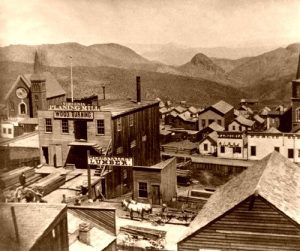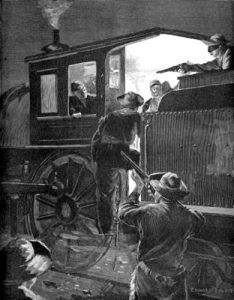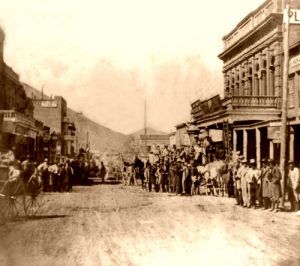Though Andrew Jackson “Big Jack” Davis started as an honest miner, his career changed shortly after moving from California to Nevada. A well-educated and intelligent man, “Jack” Davis had been mining in the Sierra Nevada Mountains, but when he didn’t find his fortune in gold, he moved on to the Comstock Lode in Nevada Territory in late 1859. This time, however, rather than working as a miner, he felt that his fortune might be made in providing services to the miners rather than carrying on the back-breaking work of actual mining, and he soon built the first stable in Gold Hill.
As he soon tired of shoveling hay, grain, and manure, Davis leased a small bullion mill in Six Mile Canyon east of Virginia City, Nevada. In addition to providing services to area miners, the mill was also doing a bit of underhanded work.
By all appearances, Davis was a legitimate businessman. However, he was secretly rounding up a gang of thieves that was soon be involved in robbing stagecoaches, bullion wagons, and trains in Western Nevada. Using his mill to melt down the stolen gold, he soon sold “legitimate” gold bars.
On November 4, 1870, Davis led the gang in holding up the Central Pacific Railroad between Verdi and Reno, Nevada. Along with gang members John Squires, James Gilchrist, Tilton Cockerill, and R.A. Jones, the robbers boarded the train at Verdi. When it reached a deserted stretch of track paralleling the Truckee River, the robbers slipped the pin behind the express car, and the passenger coaches fell back. As they entered the Express car, the Wells-Fargo messenger gave the outlaws no trouble. They then ordered the engineer to pull to a stop at an abandoned stone quarry, and the robbers rode off with nearly $40,000 in gold and silver coins.
Though the outlaws had done a “good” job robbing the train and getting the lead on their pursuers, they would be undone by R.A. Jones when he began to spend his share of the loot foolishly. Unable to explain his newly found wealth, he was picked up for questioning in the robbery, soon confessed, and named the others. Much of the stolen cache was said to have been returned to the company, but the rest was allegedly buried along the north bank of the Truckee River, between Reno and Laughton’s Hot Springs west of town, near the site of the long-abandoned River Inn. (see Stolen Loot at the Truckee River)
All five men were sentenced to serve time in the Nevada State Prison. Davis was sentenced to serve ten years. In 1871, 29 prison inmates broke out in the largest prison escape in the West. The inmates included three of Verdi train robbers, but though Davis could easily have left with the others, he refused. Later, he cooperated with prison officials to provide information on the escapees. The prison warden, P.C. Hyman, later wrote to the Board of Pardons, explaining Davis’s assistance and requesting his release. He was let go on February 16, 1875.
Though Davis had been a model prisoner, it didn’t take him long to return to his old ways after his release. He was soon robbing stages again. He was cautious to rob only those stages that carried one shot-gun messenger, but his cautiousness, in the end, would not be enough. On September 3, 1877, he went to rob a stagecoach at Warm Springs, Nevada. During the attempted robbery, he was shot and killed.
Treasure hunters have long searched in Six-Mile Canyon and along the Truckee River, looking for the gold that Davis was said to have buried, without success. Another legend abounds that the treasure is protected by the ghost of Jack Davis, who appears as a white screaming phantom to scare the hunters away.
© Kathy Alexander/Legends of America, updated November 2022.
Also See:
Stolen Loot at the Truckee River
Virginia City and the Comstock Lode



